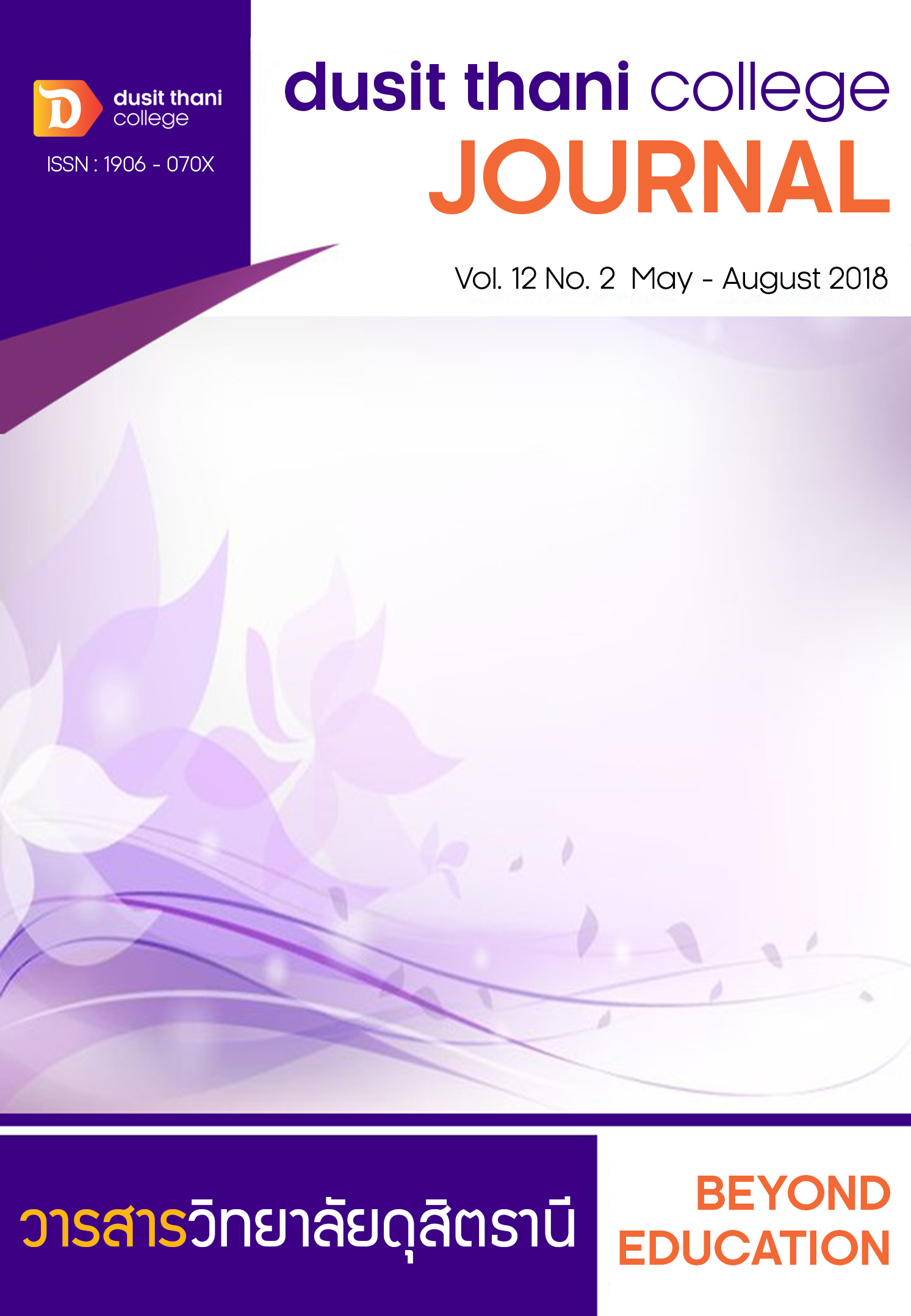สมรรถนะอาชีพมัคคุเทศก์นำเที่ยวทะเลชายฝั่ง ตามกรอบแนวคิดการวิเคราะห์หน้าที่
Main Article Content
บทคัดย่อ
สมรรถนะอาชีพ เป็นสิ่งที่แสดงคุณลักษณะทางอาชีพ เพื่อให้ผู้ที่ต้องการประกอบอาชีพมีความเข้าใจ มุ่งมั่นและฝึกฝนตนเองเพื่อให้เป็นผู้ที่มีความรู้ ความเชี่ยวชาญในอาชีพซึ่งแสดงโดยสมรรถนะอาชีพนั้น ๆ ดังนั้น การวิจัยนี้จึงมีวัตถุประสงค์เพื่อศึกษาคุณลักษณะของผู้ประกอบอาชีพมัคคุเทศก์นำเที่ยวทะเลชายฝั่ง และสมรรถนะอาชีพมัคคุเทศก์นำเที่ยวทะเลชายฝั่ง ตามกรอบแนวคิดการวิเคราะห์หน้าที่ โดยใช้ระเบียบวิธีวิจัยเชิงพรรณนา ประชากรเป้าหมายในการวิจัย ได้แก่ ผู้ประกอบอาชีพมัคคุเทศก์นำเที่ยวทางทะเล ผู้ประกอบการธุรกิจท่องเที่ยวทางชายฝั่งทะเล และนักวิชาการด้านการท่องเที่ยว จำนวน 30 คน เครื่องมือที่ใช้ในการเก็บข้อมูล ได้แก่ แบบบันทึกการประชุมกลุ่ม ประกอบด้วย คุณลักษณะของผู้ประกอบอาชีพมัคคุเทศก์นำเที่ยวทะเลชายฝั่ง และรวบรวมข้อมูลด้วยวิธีการประชุมกลุ่มเพื่อหาฉันทามติ วิเคราะห์ข้อมูลโดยใช้การวิเคราะห์เนื้อหา จัดกลุ่มข้อมูลและสรุปผลตามประเด็นการสนทนา
ผลการวิจัยพบว่า 1) คุณลักษณะที่พึงประสงค์ของผู้ประกอบอาชีพมัคคุเทศก์นำเที่ยวทะเลชายฝั่ง ประกอบ ด้วย 1. ผู้ให้ความรู้ที่ดี 2. ผู้วางแผนและประสานงานที่ดี 3. ผู้สร้างความบันเทิงที่ดี 4. นักการสื่อสารที่ดี 5. ผู้ให้บริการและอำนวยความสะดวกที่ดี และ 6. ผู้นำกลุ่มที่ดี 2) สมรรถนะอาชีพมัคคุเทศก์นำเที่ยวทะเลชายฝั่งสรุปเป็นหน้าที่งานหลัก (Key role) 10 หน้าที่หลัก ดังนี้ 1) วางแผนการนำเที่ยวทางทะเลชายฝั่ง 2) รับ – ส่งนักท่องเที่ยวที่จุดนัดหมาย 3) สื่อสารเพื่อการนำเที่ยวทางทะเลชายฝั่ง 4) ดำเนินกิจกรรมท่องเที่ยวบริเวณทะเลชายฝั่ง 5) ส่งออกนักท่องเที่ยว 6) วางแผนด้านความปลอดภัยของนักท่องเที่ยวทางทะเลชายฝั่ง 7) ช่วยเหลือนักท่องเที่ยวทางทะเลชายฝั่งให้ได้รับความปลอดภัยทั้งชีวิตและทรัพย์สิน 8) วิเคราะห์ความต้องการการช่วยเหลือ หรือข้อเรียกร้องพิเศษของนักท่องเที่ยว 9) ทำรายงานการปฏิบัติงานนำเที่ยวทางทะเลชายฝั่ง และ 10) ทำรายงานประเมินผลการปฏิบัติงานนำเที่ยวทางทะเลชายฝั่ง
Article Details
นโยบายการพิจารณากลั่นกรองบทความ
- บทความวิจัยและบทความวิชาการทุกเรื่องที่จะได้รับการตีพิมพ์ต้องผ่านการพิจารณากลั่นกรองโดยผู้ทรงคุณวุฒิ (Peer Review) ในสาขาที่เกี่ยวข้อง จำนวน 3 ท่าน/บทความ
- บทความ ข้อความ ภาพประกอบและตารางประกอบที่ลงตีพิมพ์ในวารสารเป็นความคิดเห็นส่วนตัวของผู้เขียน กองบรรณาธิการไม่จำเป็นต้องเห็นด้วยเสมอไป และไม่มีส่วนรับผิดชอบใด ๆ ถือเป็นความรับผิดชอบของผู้เขียนแต่เพียงผู้เดียว
- บทความที่จะได้รับการตีพิมพ์จะต้องไม่เคยตีพิมพ์ เผยแพร่ที่ใดมาก่อน และไม่อยู่ระหว่างการพิจารณาของวารสารฉบับอื่น หากตรวจสอบพบว่ามีการตีพิมพ์ซ้ำซ้อน ถือเป็นความรับผิดชอบของผู้เขียนแต่เพียงผู้เดียว
- บทความใดที่ผู้อ่านเห็นว่าได้มีการลอกเลียนหรือแอบอ้างโดยปราศจากการอ้างอิง หรือทำให้เข้าใจผิดว่าเป็นผลงานของผู้เขียน กรุณาแจ้งให้กองบรรณาธิการวารสารทราบจะเป็นพระคุณยิ่ง
เอกสารอ้างอิง
Boyatzis, R.E. (1982). The Competence manager: A model for effective performance.
New York: Wiley.
Boyatzis, R.E. (1982). Competence at work. In a Stewart (Ed.), Motivation and society.
An Francisso: Jossey - Bass.
Carroll, G and Boutall, T. (2011). Guide to Developing National Occupational Standards.
UK : Commission for Employment and Skills.
Carroll, G. and Boutall, T. (2011). Guide to Developing National Occupational Standards. UK Commission for Employment and Skills. (Online). https://www.gov.uk/government/uploads/system/uploads/attachment_data/file/304239/nos-guide-for-_developers-2011.pdf., 1 มิถุนายน 2556.
Chareonwongsak. Kriengsak. (2014). The Understanding for Adaptation to ASEAN and Globalization. Report Annual General Meeting Board 2014. Bangkok : Professional Tourist Guide Association of Thailand.
Deissinger, Th and Hellwig,. (2011). Structures and functions of Competency-based Education and Training (CBET): a comparative perspective. Germany : Deutsche Gesellschaft fur International Zusammenarbeit (GIZ) GmbH.
Department Of Employment. (2016). 200 career information that the labor market needs. Bangkok : Arun Printing.
Department of Tourism. (2014). Summary of foreign tourists January - December 2013. Bangkok.
Department of Trade Negotiations. (2012). ASEAN Mutual Recognition Arrangement on Tourism Professionals. Bangkok.
Dickman, s. (1997) tourism: an introductory text. holder education, rydalmere, new south wales.
Dusit Thani College. (2011). Directing the Future: the Challenge of Tourism and Hospitality Innovations. Bangkok : Tourism Management department.
European Communities. (2008). Skill needs in Europe Focus on 2020. Thessaloniki : The European Centre for the Development of Vocational Training.
European Communities. (2008). Explaining the European qualifications framework for lifelong learning. BLUXEMBOURG: OFFICE FOR OFFICIAL
Hiroe, Tanaka. (2010). Competence Model and Elements Required for Tour Guides. Japan.
Institute for Tourism Personnel Training. (2011). MRA on Tourism Professionals. Bangkok.
Kasipar, Chana. (2003). Professional qualifications : Case study of England, Scotland, Australia and New Zealand. Bangkok : Office of the Education Council.
Labjaturaput, Veena. (2013). Tourism Industry and Governmental Policy. Division of Tourism Business and Guide Registration. Southern Branch, District 2.
McClelland, D.C. (1975). A Competency model for human resource management specialists to be used in the delivery of the human resource management cycle. Boston: Mcber.
Ministry of Labour. (2013). The Study report of Workforce Preparedness for ASEAN Movement. Bangkok
Ministry of Tourism and Sports. (2011). National Tourism Development Plan 2012 - 2016. Bangkok.
Ministry of Tourism and Sports. (2016). Tourist situation 2015. Bangkok.
Saentong, Narongwit. (2003). Job Description technical based on Competency and KPI. Bangkok: HR Center.
Singburaudom, Kulprapat. (2008). Needs assessment for the development of a tourism management training curriculum for local government administration. Master of Education Program in Adult Education and Continuing Education. Mahidol University.
Spencer, L.M. and Spencer, S.M. (1993). Competence at work: Model for superior performance. Wiley, New York.
Thammakittipob, Varataya. (2010). Innovation and Change in Vocational Education. Bangkok: Kasetsart University Press.
The University of Queensland. (n.d.) ASEAN Common Core Standard Competency for Tourism Professionals: An Awareness Program. (Online). https://www.uq.edu.au/
cbamt/docs/training-resources/CBAMTCBTAwarness.ppt.,18 มกราคม 2558.
Tipnak, Peeraponk. (2015). Philosophy and vocational education. Tanning Handout.
Tourism Western Australia. (2009). Quickstart_five A's of TourismLOW. Australia.
UNWTO. (1997). Tourism 2020 Vision. Madrid: UNWTO.
Uthairat, Asavarit. (2006). Development of Competency – Based Training Model for Tourist Guides. Doctor of Philosophy (Vocational Education) Kasetsart University.
Wongsawat, Sunsanee. (2014). Guidelines of the Tourist Guide Potential Development toward Thai Tourist Guide Standard and ASEAN Common Competency Standards for Tourism Professionals: ACCSTP (A case study of Koh Samui, Surat Thani) Master of Business Administration in Tourism Management, Prince of Songkla University.


